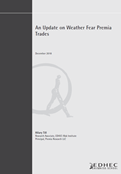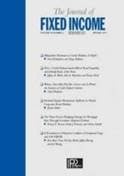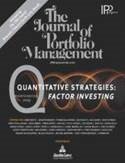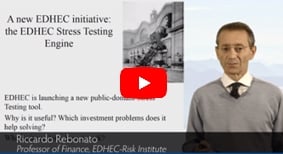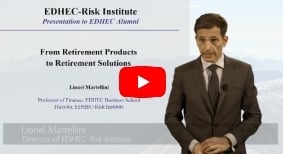|
Editorial
|
|
|
EDHEC-Risk on Factor Investing in Sovereign Bond UniversesThe abundance of theoretical and empirical research on factor investing in the equity universe stands in sharp contrast to the relative scarcity of research about how to efficiently harvest risk premia in bond markets. That relatively little is known about the out-of-sample performance of factor-based bond portfolio construction methods is perhaps surprising given the importance of fixed-income investments in institutional and private investors’ portfolios. From the investment practice standpoint, a similar contrast actually exists between factor investing in the equity space, which is a relatively mature subject, and factor investing in bond markets, which still is in its infancy. A dedicated analysis of risk premia in bond markets is therefore critically needed for the emergence of truly meaningful smart factor investing solutions in the fixed-income space.
|
|
|
Feature
|
Do Financial Mistakes by Households Matter for Society?In the paper titled “Does Household Finance Matter? Small Financial Errors with Large Social Costs,“ the authors examine the welfare losses from underdiversification in a richer framework that allows underdiversification to impact also asset allocation (that is, the share of wealth to allocate to risky assets and the share to the safe asset), consumption (that is, how much to withdraw from one’s portfolio to fund consumption at each date over a household’s lifetime), and aggregate growth for the economy. The advantage of this framework is that it provides additional channels through which underdiversification can lead to welfare losses for individual households and also the overall economy. In the framework they consider, the production decisions of firms are endogenous. They also model households so that they exhibit familiarity biases, which leads households to concentrate investments in a few familiar firms rather than holding a portfolio that is well diversified across all firms. Importantly, they specify that familiarity biases cancel out across households implying that their results are not a consequence of aggregate familiarity biases.
|
|
|
Interview
|
|
|
"Harvesting the governance bonus: how boards can improve their investment decision-making process" - an interview with Jaap van Dam, Kees Koedijk and Alfred SlagerIn this interview, we talk to Jaap van Dam, Principal Director of Investment Strategy at PGGM and Member of the EDHEC-Risk Institute Institutional Advisory Board, Kees Koedijk, Dean of TIAS Business School and Alfred Slager, Professor of Pension Fund Management at TIAS Business School and Trustee at SPH, the Dutch pension fund for Genera Practitioners, about the release of their new book: "ACHIEVING INVESTMENT EXCELLENCE - A Practical Guide for Trustees of Pension Funds, Endowments and Foundations". We discuss the content of the book, the main reasons for writing it, the objectives they had in mind and the principal issues faced by trustees. We take a deeper look into the next steps in their mission to help the trustees and the authors conclude by explaining why they have decided to involve EDHEC-Risk Institute in this research work.
|
|
|
Industry Analysis
|
P&I: Introducing "Flexicure" Investment SolutionsIn this article, we propose to apply the principles of goal-based investing to the design of a new generation of "flexicure" retirement investment strategies, which aim at offering the best-of-both-worlds between insurance products and asset management products. These strategies can be used to help individuals and households secure minimum levels of replacement income while generating upside exposure through liquid and reversible investment products. In implementation, recent advances in financial engineering and digital technologies make it possible to apply goal-based investing principles to a much broader population of investors than the few traditional clients who can afford customised mandates or private banking services. This environment creates an opportunity to provide genuine investment solutions, as opposed to off-the-shelf products, to individuals preparing for retirement.
|
IPE: Main results from the EDHEC European ETF and Smart Beta and Factor Investing Survey 2018EDHEC-Risk Institute conducted its 11th survey of European investment professionals on the usage and perceptions of exchange-traded funds (ETFs) at the beginning of 2018. This annual survey, introduced in 2006, and initially entirely devoted to ETFs, now also dedicates a large group of questions to investors' general use and opinion of smart beta and factor investing strategies, with a special focus on fixed income. In the present article, we sum up the main results of the survey. We first turn to key results concerning ETF usage and selection, and then address results relating to the use of smart beta and factor investing strategies. We conclude with investor perspectives for future developments.
|
Peak Smart BetaAdvances in using big data and applying adaptive learning techniques to financial analysis to deal with uncertainty is gradually moving into the mainstream. If investors accept that smart beta strategies are a variation of active management, they should spend the time and effort to identify the best of breed providers that can genuinely make a difference to their long-term outcomes. And that brings the reader back to the author’s “peak smart beta“ suggestion.
|
|
|
Research Publications
|
|
|
An Update on Weather Fear Premia, by Hilary TillThis article reviews a class of trading strategies known as "weather fear premia" trades. The article describes them, arguing that they may comprise a type of risk premium and noting the extra diligence needed in their risk management. The author notes that both superior trade construction and an analysis of fundamentals are also critical for the successful implementation of these types of trades. The article concludes with a cautionary note on a catastrophic trading blow-up that occurred in November 2018, illustrating the risk of such strategies.
|
|
|
The Three-Factor Hedging Strategy for Mortgage Pass-Through Securities: Empirical Evidence, with Frank FabozziUnlike hedging interest rate risk in the other sectors of the investment-grade bond market, the cash flow structure of mortgage pass-throughs is such that there is interest rate exposure, via prepayment rates, due to a change in the term structure of interest rate. Both academics and practitioners have proposed several strategies for hedging interest rate risk. In this article, the authors evaluate a three-factor hedging strategy for agency pass-throughs, comparing the performance of this strategy to both the single-factor and two-factor hedging strategies. Their analysis finds that under certain conditions, the three-factor hedging strategy outperforms both the one- or two-factor hedging strategy.
|
|
|
A Factor- and Goal-Driven Model for Defined Benefit Pensions: Setting Realistic Benefits, with Lionel MartelliniA factor and goal-driven framework for assessing asset allocation and contribution decisions within defined-benefit pension plans is developed in this article. A critical element is setting future benefits with reference to the ability of the pension sponsors to support liabilities under reasonable investment expectations. The approach suggested by the authors combines a micro study of a representative cohort of individuals with an aggregation across a target population to estimate consistency between the micro and macro environments. A stochastic inflation risk factor affects both contribution and spending cash flows. This agent-based model suggested by the authors provides a more realistic framework than traditional approaches for setting pension benefits.
|
|
|
Video
|
|
"Bayesian Nets for Stress Testing, Portfolio Management and Scenario Analysis" - with Riccardo Rebonato, Professor of Finance at EDHEC Business School. He explains why the EDHEC stress-testing tool is useful, which investment problems it helps to solve and what it is and how it works. The EDHEC Stress testing engine provides a tool for analysing complex financial scenarios in a coherent, intuitive yet mathematically rigorous way. The underlying methodology is based on the Bayesian Net technology.
|
Webinar: "From Retirement Products to Retirement Solutions" - an application of Goal-Based Investing principles to a major goal for individual investors, namely retirement. Professor Lionel Martellini discusses the retirement problem and how to move away from retirement products, that may not be so useful at addressing the retirement needs of investors, towards meaningful retirement solutions. We need customised solutions meeting our particular needs.
|
|
|
|
|
|
|
News
|
|
|
|
|
|
|
|
|
Call for sponsorship – Digital Programme on Data Science in Investment ManagementCollaboration is the next disruption in Education: That is why EDHEC-Risk Institute has teamed up with Coursera, the world’s largest learning platform with about 40 million registered learners all over the word, to develop a digital programme in Data Science in Investment Management. Play a part in the Revolution of Education and boost your visibility by relying on a New Channel.
|
|
|
A great success for the 3rd edition of the Four-University Rotating FinTech Conference seriesA great success for the Advances in FinTech and Applications to Investment Solutions for Individuals Conference with over 100 professionals at the Palais Brongniart in Paris, to debate the future of investment management in the digital era. This 3rd edition has demonstrated once again the successful collaboration of EDHEC-Risk Institute, KAIST, Princeton, and Tsinghua Universities.
|
|
|
|
|
|
Press Review
|
EDHEC-Risk Institute has been cited widely in the business and industry press. A selection of articles may be found below.
• "Private banks must take goals-based tech to heart", Professional Wealth Management (15/04/2019)
• "Fed funds’ projections lower in March", Money Management (12/04/2019)
• "Eduquons les Français à la finance !", Les Echos (30/03/2019)
• "Three things your clients may call you about this week…", Professional Adviser (24/03/2019)
• "Pension CRISIS: How would the UK solve a retirement TIME-BOMB?", The Daily Express (23/03/2019)
• "L’OBLIGATAIRE tenté par le «smart beta»", L’Agefi (14/03/2019)
• "EDHEC-Risk Institute, KAIST, Princeton, Tsinghua Universities: How Will FinTech Change the Future Of Financial Services?", MondoVisione (12/03/2019)
• "Fresh Insights on the Smart Beta Space", HedgeNordic (04/03/2019)
• "Behavioral-finance expert takes top Bernstein Fabozzi/Jacobs Levy award", Pensions & Investments (01/03/2019)
• "High cash holdings a scandalous investment for someone in retirement", Kiwi Investor (20/02/2018)
• "Risk premia still negative - Is a Recession priced in the curve?", MondoVisione (31/01/2019)
• "Fed's low confidence signals recession", Investors Chronicle (17/01/2019)
• "Hedge funds : les émules de Soros dans le rouge en 2018", Les Echos (08/01/2019)
• "European funds souring over smart beta options", Pensions&Investments (07/01/2019)
• "Flexicurity in Retirement Income Solutions – making finance useful again", Kiwi Investor (24/12/2018)
• "Amundi’s Perrier eyes next opportunities", Global Investor Group (18/12/2018)
|
|
|
Stay tuned for more research, outreach, education and industry partnership developments on investment solutions for institutions or individuals
|
|
About EDHEC-Risk Institute:
Part of EDHEC Business School and established in 2001, EDHEC-Risk Institute has become the premier academic centre for industry-relevant financial research. In partnership with large financial institutions, its team of permanent professors, engineers, and support staff, and research associates and affiliate professors, implements seven research programmes and six research, industrial partnerships and private research projects focusing on asset allocation and risk management. Additionally, it has developed an ambitious portfolio of research and educational initiatives in the domain of investment solutions for institutional and individual investors. As part of its "Make an Impact" signature, EDHEC-Risk plays a noted role in furthering applied financial research and systematically highlighting its practical uses.
EDHEC-Risk Institute
393 Promenade des Anglais, BP 3116,
06202 Nice Cedex 3, France
E-mail: [email protected]
Telephone: +33 493 187 887
Web: https://risk.edhec.edu
|
Subscription Options:
You have received this e-mail as a financial professional listed in our database, or because you have agreed to receive communications from us. Please consult our Privacy Notice for more information.
• If you no longer wish to receive any information from EDHEC-Risk Institute, you may unsubscribe here.
• If you wish to update your contact details, please inform us here.
To ensure that you continue to receive e-mails from EDHEC-Risk Institute, please add our organisation to your "Safe Senders" list.

|
|




